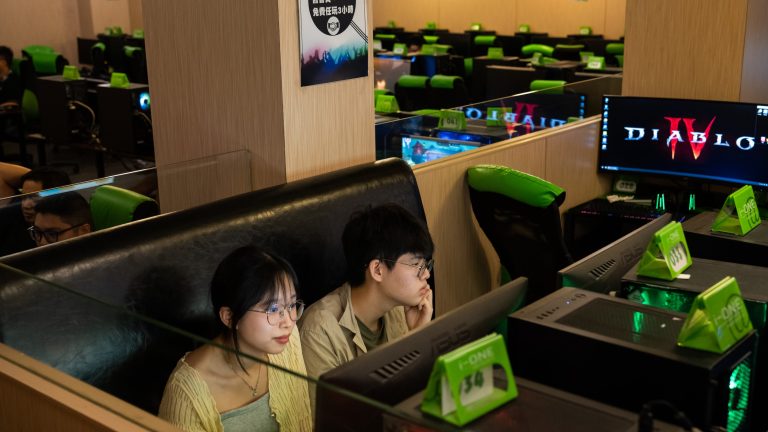IIn Hong Kong, a city with excellent internet coverage but extremely cramped accommodation, internet cafes have long been a haven for teenage gamers fleeing parental reproaches, delivery workers on break and couples looking for a cheap but fun date.
For the equivalent of less than $10, they can spend hours or entire nights in dimly lit, air-conditioned rooms playing video games, watching movies, indulging in bowls of instant noodles, or falling asleep to the clicks of mice and keyboards.
High-speed and affordable internet in Hong Kong means that people don’t usually turn to coffee shops to get online. When the city’s internet cafe industry recovered around the year 2000, it primarily catered to a growing number of gamers who were unable to afford their own facilities. Groups of friends have gathered to play Counter-Strike, Rainbow 6 and Audition Online.
The industry got so big that cafes started competing directly with each other. Alfred Chan, owner of Hong Kong’s largest internet cafe chain, i-ONE, recalled how one café enticed customers with unlimited pineapple sandwiches, signed by a Hong Kong bakery. At their peak in the late 2000s, Chan said Rest of the worldthere were more than 500 internet cafes in Hong Kong.
But business gradually declined in the 2010s. Rents soared and people increasingly turned to their phones to play games, watch videos, and work online. During the Covid-19 pandemic, internet cafes were forced to close for months; many gamers have bought new Nintendo Switch computers and consoles to play at home. Many once-popular Internet cafes have closed permanently, and the few that remain are struggling to survive.
i-ONE
In the heart of the bustling Mong Kok shopping district, above a yoga studio, hair salon and escape room, one of i-ONE’s internet cafes was half full on a Wednesday afternoon in June. Couples crowded into the two-person cabins. College students joined in a shooter game and cursed loudly in Cantonese as their avatars were killed. Staff greeted guests in front of a small shelf filled with chips, instant noodles and Monster energy drinks.
Venus Yeung, 21, watched a Japanese anime series after her morning shift at a claw machine shop. She was a regular visitor to the i-ONE cafe, she had spent the nights here when she had moved away from the family home for the first time and could not afford a hotel. I feel so comfortable and relaxed, she said Rest of the world. For about 40 Hong Kong dollars ($5.10), I can buy myself relaxation and happiness. I think it’s worth it.
Owner Alfred Chan opened i-ONE in 1999. The son of an entrepreneur who founded a Chinese medicine trading company, Chan was frustrated with his poor internet connection at home and saw the potential in renting out computers and internet services to other Hong Kongers.
It was a success. Early on, 90 percent of her customers were men, but the release of Audition Online, a dance game first introduced in South Korea in the mid-2000s, brought in more women, Chan recalled. Immigrant domestic workers from Indonesia and the Philippines have come to chat with their families from the cafes. In 2005, when Korean farmers came to Hong Kong to protest a WTO conference, journalists flocked to the i-ONE branch in Mong Kok to use its fast internet connection, transforming the venue into a makeshift international news hub.
Around 2012, i-ONE, with a franchise model, had 40 branches across Hong Kong. But over the next decade, the rise of mobile internet and the Covid-19 shutdowns decimated the industry. Now there are only five i-ONE cafes left.
Some new customers have emerged during the post-pandemic era. Chan said pop fans come in to buy concert tickets they need, hoping the faster internet will give them an edge over other fans.
But Chan also said the industry’s decline seems inevitable. Covid[-19] it was the last straw, he said, adding that the few remaining stores had survived on loyal customers. I can’t rule out that one day they won’t come back and we could become the last internet cafe [Hong Kongs] history.


J.Net e-sports center
Kwun Tong
Located in a residential area in eastern Kowloon, the internet cafe J.Net has two distinct types of patrons: in a dimly lit room and between rows of computers, young gamers don headsets and battle it out in League of Legends or Diablo. In the next room, elderly patrons sit around banquet tables under bright, fluorescent lights, playing mahjong and eating seafood platters.
This is how J.Net is surviving the crisis in the sector. Owner Joe Poon, 42, said he opened his first internet cafe in 2013 when Hong Kongers queued for seats during peak hours. You know how small houses in Hong Kong are, Poon said Rest of the world, noting that many families had their only computer set up in the living room. If you play there, your family will yell at you all the time.
Poon had two internet cafes, which were fine until the pandemic hit. To contain the Covid-19 outbreak, the government closed gambling venues, along with nightclubs and beauty salons, for months. Eventually Poon closed a branch and turned J.Net into a restaurant serving seafood and traditional dishes cha chaan tengor Hong Kong diner dishes.
Now, the game’s restaurant and café exist side by side, each serving their own community. This was said by Kim Wong, 35, who works remotely for a driving school Rest of the world use J.Net as a co-working space. He said he answers emails and takes calls from the gaming desk. From time to time he plays a few video games with other customers.
Since May, J.Net has been hosting free League of Legends and Apex Legends classes with a government-backed sports organization. KY Lee, 24, an aeronautical engineer and former esports athlete, teaches the Apex course. During the pandemic, he said Rest of the world, esports athletes have switched to communicating on Discord instead of training together in person at internet cafes. J.Net is trying to bring gamers together in one physical space again, but it’s been tough.
Post-Covid-19, the restaurant business grew much faster than esports, Poon said. Three years ago, the 140-seat space would have been 80 percent full. But these days, the café typically only has 10 to 30 players. Poon recently moved some gaming chairs to the banquet section, a tacit acknowledgment of the future of the internet cafe business. We used to call it a sunset industry, he said, but now it’s like a dead, stagnant pool.









